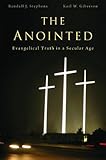The anointed : evangelical truth in a secular age / Randall J. Stephens, Karl W. Giberson.
Material type: TextPublication details: Cambridge, Mass. : Belknap Press of Harvard University Press, 2011.Description: 1 online resource (356 pages, 14 unnumbered pages of plates) : illustrationsContent type:
TextPublication details: Cambridge, Mass. : Belknap Press of Harvard University Press, 2011.Description: 1 online resource (356 pages, 14 unnumbered pages of plates) : illustrationsContent type: - 9780674062672
- 0674062671
- 0674072081
- 9780674072084
- Evangelicalism -- United States
- Intellect -- Religious aspects -- Christianity
- Christian conservatism -- United States
- Conservatism -- Religious aspects -- Christianity
- Christianity and politics -- United States
- Church and state -- United States
- Christianity and culture -- United States
- United States -- Church history
- Évangélisme -- États-Unis
- Intelligence -- Aspect religieux -- Christianisme
- Conservatisme chrétien -- États-Unis
- Conservatisme -- Aspect religieux -- Christianisme
- Christianisme et politique -- États-Unis
- Église et État -- États-Unis
- États-Unis -- Histoire religieuse
- RELIGION -- Christianity -- History
- RELIGION -- Christian Church -- History
- Christian conservatism
- Christianity and culture
- Christianity and politics
- Church and state
- Conservatism -- Religious aspects -- Christianity
- Evangelicalism
- Intellect -- Religious aspects -- Christianity
- United States
- 277.3/082 23
- BR1642.U5 S73 2011eb
- online - EBSCO
| Item type | Current library | Call number | URL | Status | Notes | Barcode | |
|---|---|---|---|---|---|---|---|
 eBook
eBook
|
Biblioteca "Angelicum" Pont. Univ. S.Tommaso d'Aquino Nuvola online | online - EBSCO (Browse shelf(Opens below)) | Online access | Not for loan (Accesso limitato) | Accesso per gli utenti autorizzati / Access for authorized users | (ebsco)411022 |
Browsing Biblioteca "Angelicum" Pont. Univ. S.Tommaso d'Aquino shelves, Shelving location: Nuvola online Close shelf browser (Hides shelf browser)
Includes bibliographical references and index.
The answer man -- The amateur Christian historian -- The family of God -- Trust me, the end is near -- A carnival of Christians -- Made in America.
Print version record.
American evangelicalism often appears as a politically monolithic, textbook red-state fundamentalism that elected George W. Bush, opposes gay marriage, abortion, and evolution, and promotes apathy about global warming. Prominent public figures hold forth on these topics, speaking with great authority for millions of followers. Authors Stephens and Giberson, with roots in the evangelical tradition, argue that this popular impression understates the diversity within evangelicalism--an often insular world where serious disagreements are invisible to secular and religiously liberal media consumers. Yet, in the face of this diversity, why do so many people follow leaders with dubious credentials when they have other options? Why do tens of millions of Americans prefer to get their science from Ken Ham, founder of the creationist Answers in Genesis, who has no scientific expertise, rather than from his fellow evangelical Francis Collins, current Director of the National Institutes of Health?Exploring intellectual authority within evangelicalism, the authors reveal how America's populist ideals, anti-intellectualism, and religious free market, along with the concept of anointing--being chosen by God to speak for him like the biblical prophets--established a conservative evangelical leadership isolated from the world of secular arts and sciences. Today, charismatic and media-savvy creationists, historians, psychologists, and biblical exegetes continue to receive more funding and airtime than their more qualified counterparts. Though a growing minority of evangelicals engage with contemporary scholarship, the community's authority structure still encourages the "anointed" to assume positions of leadership
Why do so many evangelicals follow leaders with dubious credentials when they have other options in their own faith? Exploring intellectual authority within evangelicalism, the authors reveal how the concept of anointing--being chosen by God to speak for him--established a conservative evangelical leadership isolated from secular arts and sciences.
In English.









